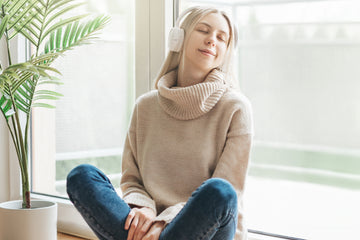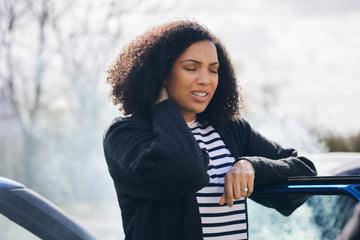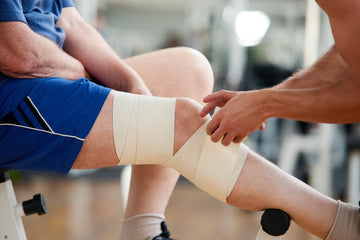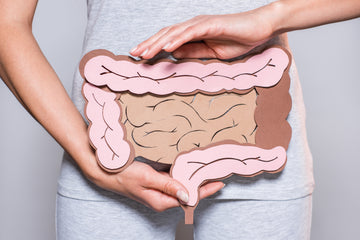Anxiety can infiltrate our thoughts, emotions, and physical well-being – making it almost impossible to relax at times. Whether it is work stress, navigating personal relationships, or just handling our daily routines, anxiety can create problems for us mentally, physically, and emotionally, requiring us to find ways of reducing or alleviating it. Although seeking help from a mental health professional is essential, natural anxiety relief and home remedies can complement traditional treatments and help manage anxiety symptoms effectively.
What is Anxiety?
What exactly is anxiety? Anxiety is the body’s natural response to stress. When the body encounters stress, it releases higher levels of cortisol - preparing the body for a 'fight or flight' reaction, but when anxiety becomes too overwhelming it can interfere with daily functioning and quality of life. Symptoms of anxiety can vary widely, but it typically includes feelings of nervousness, restlessness, increased heart rate, rapid breathing, muscle pain, and difficulty concentrating.
Home Remedies for Anxiety
Anxiety can hit anyone at any time, making it necessary to learn tools and strategies for at home anxiety relief. Finding relief for anxiety at home can involve a variety of strategies that focus on promoting relaxation to lower cortisol levels naturally, managing stress, and promoting a sense of calm.
Relaxation Techniques to Reduce Anxiety
Relaxation is a vital tool in the battle against anxiety because it counteracts the physiological and psychological effects of stress. Relaxation techniques can help regulate the autonomic nervous system, which plays a central role in the body's stress response, leading to long-term benefits for overall health and well-being. Some relaxation techniques to try include:
- Deep breathing: Deep breathing exercises can help calm the nervous system and promote relaxation. You can practice mindful breathing by taking slow, deep breaths in through your nose, allowing your abdomen to expand, and exhaling slowly through your mouth.
- Progressive muscle relaxation (PMR): PMR involves tensing and relaxing different muscle groups in the body at different intervals. Start by tensing a muscle group for a few seconds, then release and relax. Move through each muscle group from head to toe, focusing on the sensation of relaxation.
- Visualization: Visualization techniques involve mentally picturing a peaceful scene or engaging in guided imagery exercises. There are a number of ways to do this, but the easiest method is to close your eyes and imagine yourself in a serene environment, such as a beach or forest. Spend a few moments quieting your mind by visualizing the sights, sounds, and sensations of being in that peaceful place.
Lifestyle Changes for Natural Anxiety Relief
Many of our life's stressors result from physical lifestyle factors, like work demands, relationships, financial pressures, and unhealthy habits. Making appropriate lifestyle changes can reduce stress, which in turn reduces the amount of anxiety we feel overall. Lifestyle changes may include:
- Regular exercise: Physical activity is a powerful tool for reducing anxiety and improving mood. Try exercising for at least 30 minutes using moderate exercise multiple days of the week. If you’re not sure where to start, you can incorporate walking, jogging, swimming, or yoga. These can all be beneficial for reducing stress and anxiety.
- Balanced diet: Eating a nutritious diet rich in whole foods, like lean proteins, a variety of fruits, whole grains and vegetables, can support overall well-being and help regulate mood. It’s also important to avoid certain items in excess like caffeine, sugar, and processed foods, which can worsen existing anxiety.
- Good sleep hygiene: Quality sleep is essential for managing anxiety. Establish a regular sleep schedule you can stick to and create a relaxing bedtime routine that your brain and body can anticipate. This will help make sure your sleep environment is restful. Limiting screen time before bed and avoiding caffeine or heavy meals late in the evening can also contribute to restful sleep.
Herbal Remedies for Natural Anxiety Relief
Many people prefer natural anxiety relief through herbal remedies over pharmaceutical interventions. Various herbs can be consumed in the form of tea, aromatherapy, massage oils, and more. These herbal remedies may include:
- Chamomile: Chamomile is well-known for its calming properties and is often consumed as a tea. It contains compounds that may help reduce anxiety and promote relaxation.
- Lavender: Lavender essential oil is commonly used in aromatherapy for its soothing scent. Inhalation of lavender oil or using it in massage oils may help alleviate anxiety symptoms.
- Passionflower: Passionflower is an herb traditionally used to treat anxiety and insomnia. It may help increase levels of a neurotransmitter called gamma-aminobutyric acid (GABA) that promotes relaxation.
- Valerian root: Valerian root is another herbal remedy with sedative properties. It's often used to improve sleep quality and reduce anxiety symptoms.
Mind-Body Practices for At Home Anxiety Relief
There is a connection between the mind and body, especially where stress and anxiety are concerned. Practicing different mindfulness activities and relaxing the body can make a big difference in finding relief from anxiety symptoms. These mind-body practices may include:
- Yoga: Yoga helps you connect to your body and be more present by incorporating breathing exercises, physical postures, and meditation. The grounding nature of these movements, coupled with breathing, help with relaxation and stress reduction. Regular practice of yoga can help reduce anxiety levels and improve overall well-being.
- Meditation: Meditation involves training the mind to focus and redirect thoughts, leading to a state of calm and clarity. Even just a few minutes of meditation each day can have significant benefits for anxiety management.
- Tai Chi: Tai Chi is a gentle form of martial arts that uses slow, flowing movements which are combined with deep breathing techniques. Practicing Tai Chi can help reduce stress and anxiety while improving balance and flexibility.
- Massage chairs: Luxury massage chairs offer a convenient way to experience the benefits of massage therapy at home. Treating yourself with a massage for anxiety and stress can help relax tense muscles, alleviate stress, and promote overall relaxation.
Creating a Calming Environment for At Home Anxiety Relief
Creating a calming environment is important for anxiety relief because it provides a sanctuary where we can find refuge from the chaos of the outside world. Simple activities like decluttering, using scents that promote relaxation (aromatherapy), and listening to soothing music can bring about a sense of calmness even when stress seems overwhelming.
Managing anxiety doesn’t always require medication or professional intervention – some natural anxiety relief and home remedies for anxiety may help effectively reduce symptoms and improve well-being. Experimenting with different techniques or implementing tools, like a luxury massage chair or various bind-mody practices, may be the answer to long-term anxiety management. It is important to note that if anxiety symptoms become chronic or persistent and interfere with your daily life, seeking help from a professional may be necessary.
Disclaimer: This content is not medical advice. Please consult with your healthcare professional when considering implementing changes to your health or workout routines to ensure it’s compatible with your needs.




